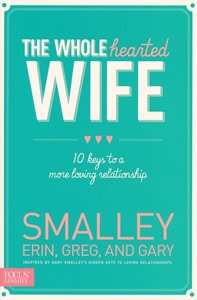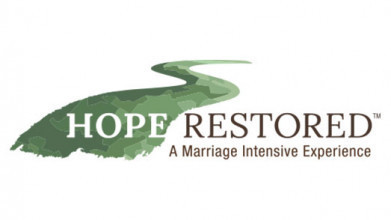Wife #1: He isn’t the man I married. He had such potential; we had potential. But we’ve gotten stuck in a rut and I’m miserable.
Wife #2: My husband and I fight a lot and we never seem to resolve anything. I wish things were different.
Wife #3: My marriage is kind of okay. We made a lifetime commitment and I think we still love each other. Maybe this is as good as it gets?
John Fuller: Well, it may be that you resonate with some of those comments. Uh, maybe your marriage is less satisfying than you expected. Uh, maybe you’d really like to improve it, but you don’t know how. Well today, we have some practical help and hope for you on Focus on the Family. Your host is Focus president and author, Jim Daly, and I’m John Fuller.
Jim Daly: John, those comments reflect the heart of so many husbands and wives that we hear from, couple who’ve lost all hope for their marriages. Sometimes, it’s a crisis like infidelity or neglect or baggage from the past that’s interfering with you and your spouse’s future. Or it may be, uh, faulty expectations about marriage where you don’t know how to resolve conflict or you thought your relationship was all about making you happy. Uh, these are common issues that couples face. But with God’s help, uh, they don’t need to be deal breakers for your marriage. Nor do you need to suffer in silence and be miserable.
Uh, here at Focus on the Family, we want to help you experience marriage the way God designed it to be, and we’ve got lots of resources that can equip you like our team of Christian counselors. Our Hope Restored, where we offer intensive counseling over several days for couples who are on the brink of divorce.
John: Yeah, we see so many lives changed through this ministry, uh, Jim, and we heard from a woman named Carrie who felt like she was trapped in a loveless marriage. Uh, she and her husband were struggling. He had some addictions. He was working all the time, he was emotionally unavailable, and Carrie was exhausted and depressed and alone. Uh, but someone introduced her to this broadcast-
Jim: Ah.
John: … and she started listening to our podcasts, and, uh, got some books that we had recommended and other resources. And today, Carrie says, “I’m still married, and our relationship continues to improve. My walk with Jesus has grown deeper through your ministry.”
Jim: Praise God. Uh, that’s wonderful news. That’s what it’s all about. And for all the husbands and wives listening right now, I believe the Lord wants you to experience that same kind of transformation in your marriage. Contact us today if you want to speak with a counselor, or learn more about Hope Restored. Or find out about the many other resources that our marriage team here at Focus is working on to help you build a strong and healthy marriage for a lifetime.
John: Yeah, and in a moment, we’ll hear from, uh, the couple that leads our marriage team here at Focus on the Family, Dr. Greg Smalley and his wife, Erin Smalley. Uh, they’re authors, speakers, and counselors, and they’ve written a book called, The Wholehearted Wife: 10 Keys to a More Loving Relationship. We’ll also mention that Greg’s dad, the late Gary Smalley, also contributed to the book.
Learn more about all of the resources we’ve mentioned so far, including the Smalley’s book, when you call 800, the letter A, and the word FAMILY. Or stop by focusonthefamily.com/broadcast.
And Jim, here’s how you began the conversation with our guests, Greg and Erin Smalley on today’s episode of Focus on the Family.
Jim: Yeah, Erin, let’s start with you. I’d like to hear your response, uh, to those comments that we heard at the top. Does that really reflect the heart of a lot of women?
Erin Smalley: You know, unfortunately I think it does. We plan these perfect weddings, and, you know, we have these almost idealistic, um, views of what our marriage relationship is gonna be like. And then quickly, we realize we married another human being-
Jim: (laughs)
Erin: … that’s imperfect.
Jim: Yeah.
Erin: And-
Greg Smalley: I’d like to think I’m more than that, but.
Jim: (laughs) Less than a human being.
Greg: Oh, there you go. Hey, welcome, Greg, to the show.
Erin: Yes. (laughs) And, you know, then, you know, with these expectations, we end up disappointed and just dissatisfied. And that’s not the case always, but often because the expectations are so high, we end up feeling disappointed. And then the relationship goes down one of those three paths of the clips we heard.
Jim: Uh, let me ask you about expectations, because especially again, uh, when you’re spiritually connected in a healthy way in a relationship with Christ, and you’re courting each other, talking about the M word, “Do you want to get married?” And then it happens. And then the weeks and the months go by. Why do expectations play such a critical role in the early development of our relationship in that way?
Greg: Well, you know, we all have them. I mean, all of us have certain hopes, desires, dreams, wants, needs that we expect that our spouse is going to meet. Now, we found this person who’s going to provide all these things that we hope. Part of the problem is that a lot of these are unknown. We’re not even aware of them. You know, we, we have these things that, at some level, we expect and assume are gonna happen. When they don’t, it’s like, “Okay, wait. What just… Why isn’t this happening? I thought this would. Doesn’t she love me? Wait, did I marry the right person?” I mean, you, you almost see this buyer’s remorse going, “What is going on?”
Jim: Well, what’s changed in that time span, whatever it might be, weeks or months or a couple of years? What’s going on? What is changing from the courtship to the marriage?
Greg: I think what happens is that when we have these unknown, kind of we’re not even aware of some of these expectations, and they don’t happen over time, it’s hurtful, we get frustrated. That can easily, though, turn into almost this resentment. Our beliefs, our view of our spouse can become so negative that once our view becomes negative of our spouse, they really can’t do much to change that. Whatever I believe about Erin, I will see the evidence in everything that she does. So, if all these expectation have gone unmet, see, now I see her in such a negative light. And then that becomes a, such a self-fulfilling prophecy. And the sad part is, she can’t change any of that. Whatever I believe is what I’m going to see. I will overlook all the positive, and that’s a part of, of how we just get set on this course, this trajectory. This is not good in our marriage.
Jim: Okay, now it sounds like you two are talking from experience.
Greg: (laughs)
Jim: So, talk about… (laughs) Kaboom, was that a big rock?
Greg: Is it that obvious? Really?
Erin: Yeah.
Jim: (laughs)
John: Oh, boy.
Jim: No, it’s not so much your PhD work that’s coming in here. But, uh, what happened day one for you? You wake up the next day, and what did you find, bliss or conflict?
Erin: Well, we went into conflict pretty quickly, um, into our marriage. I mean, literally several days into the honeymoon, we were fighting.
Jim: (laughs)
Erin: And we didn’t expect that, that’s for sure.
Jim: Over little things or big things?
Erin: Little things. I mean, what we realized is, uh, well, A, we didn’t do great premarital counseling, and that’s something that we now stand firm on with… for couples getting married. You have to get great premarital training, counseling, education, whatever with a mentor, you have to do that. We didn’t.
Jim: Did you have that attitude kinda like you knew it all?
Greg: Yeah. You know, the old saying that faith is not inherited, so just because my parents are Christian
doesn’t mean that I’m now a Christian. In the same way, that if whatever the state of our parent’s marriage, so good or bad. So, I came from this great legacy, but that in and of itself doesn’t translate that, oh, then of course I’ll inherit that. I’ll have this great marriage. You do have to work at it. There were some problems that we didn’t really understand that became a big deal once we got married.
Jim: Hm.
Erin: We had good times, we had times that we laughed a lot. But when it came to dealing with our differences, and there were quite a few of them, we didn’t know how to work through them.
Jim: Hm.
Greg: And I think that I, a lot of people, husbands and wife, they’ll reach this point of despair or, or they just settle.
Erin: Uh-huh.
Greg: Like, we heard the clips in the beginning that, you know, this mediocre marriage, that is not what God had in mind. You said it, the Author of marriage did not design a marriage that’s supposed to be, “You know, I guess i can just live with them for the rest of my life.” This is a God who said that these two people, this man and woman who are so different, as they come together and become one, this is a good thing. This is an amazing thing. There is such synergy. When Erin and I are operating within that power that God provides, you know, and our hearts are open to each other, there is such enormous strength in that to the point that Satan knows that. And Satan is afraid of what our marriage can be like.
Jim: Hm.
Greg: And that’s why it’s never… Let’s not settle. Let, let’s have the promised land kind of marriage that really God created and designed. That was his intent.
Jim: Now, let me ask you this question in terms of that pace. Uh, life is life. We’re in a broken world. Things will happen. I don’t want some, particularly some wives to hear this right now and go, “Aha, we got to live at this level.” Things will happen, and you need to roll with that and seek the Lord for solutions. And trouble will be there. The Lord was very specific about that. Talk about what seems to be healthy balance.
Greg: You know, balance for me is being aware of the fact, as you’re saying, that there are gonna be trials and problems, and we’re two humans, we’re imperfect, we have sin nature. Every once in a while, I’m selfish. Is that fair to say?
Jim: Yeah (laughs).
Erin: That would be fair to say.
Greg: Just, just, you know, just-
Jim: Just once in a while.
Greg: … to spice things up.
Erin: Just occasionally.
Jim: Yes.
Greg: And so, I think the balance is recognizing that, that therefore, we’ve got to keep working. And it’s never about settling, realizing that along the way, we’re changing. Our marriage is changing. If we just put the marriage on cruise control, send it down the road and don’t really do anything with our relationship, that is a recipe, a formula for disaster. Instead, it’s recognizing, “You know, we are human, but let’s keep growing. Let’s keep learning.” I think ideally, uh, uh, God designed us to become more like him, right, as it talks about in Romans that, that we want to become more like Christ. That’s the true opportunity within a marriage-
Jim: Hm.
Greg: … is that all this stuff as two humans that go on, and the problems and all that, that God is gonna use those things to grow us more like him. I think that’s the journey that we’re on together.
Erin: And, you know, for me, personally as a wife, I, I came into marriage, and I came from a family we didn’t do a lot of relationship training or education like Greg’s family. And so, for me, I was on this journey of really wanting to understand what I could do personally. How could I show up in this relationship? ‘Cause as we started to have problems, I, no one wants that. I didn’t want that as a wife. I wanted to be a good wife. I wanted to be a great wife. And so, I set off on a journey of learning and growing and, and in seeking the Lord. Growing in my faith, but then also getting some skills. And ironically, I learned a lot of it from Greg’s dad.
Jim: Ah.
John: Hm.
Jim: And, but the obvious point there is you, again, assumed that, that Greg had this all down, right?
Greg: (laughs)
Erin: I thought so.
Jim: Did you listen to your father? Did you ever hear that word uttered through your-
Greg: Well, y- you know, I mean, it’s… Here’s the reality. So, you can know the knowledge. You can have seen a good model. But until you really know how to translate all that into specific action within your relationship based up on the uniqueness that you both offer, that’s, I think, part of what my problem was. I knew it, sort of. I just didn’t know how to apply that. And that’s really what we were trying to do with this book.
Jim: You know, if you think about that, what you’re saying for Christians again, you’ve just hit the nail on the head. Because our heavenly Father, like your earthly father, can say all the right things.
Greg: Yeah.
Jim: But if we don’t translate that-
Greg: Yeah.
Jim: … into our own lives, it’s-
Greg: Don’t-
Jim: … no good.
John: Hm.
Greg: just don’t be hearers of the word. Be doers.
Jim: So, we can read the word, but if we don’t apply the word, what use is it?
Greg: Yeah.
Erin: Mm-hmm.
Jim: I mean, that’s an interesting analogy to what you just talked about with your own earthly dad.
Greg: Absolutely.
Jim: Um, if you don’t embrace that wisdom and that truth, it’s not gonna work.
Greg: Yeah.
Jim: And your marriages are not gonna work. In fact, you talk about 10 keys of a more loving relationship. Let’s post these, John, on the website. But-
John: Sure.
Jim: … uh, quickly go over them, and then let’s concentrate on a couple of them.
Erin: You know, really, if you think back to the ’90s, Greg’s dad had a video series. It was on VHS back then. Now it’s on DVD.
Jim: Oh, well now you’re hurting me.
Greg: What’s that? (laughs) Just rewind.
Erin: He, he sold this video series on TV called-
Jim: Yeah.
Erin: … Hidden Keys to Loving Relationships. It was an infomercial. And I’m telling you, those tapes were so impacting in my life. And so really, we based this series, the topics, this book, is based off the topics from that series. And really, so what they are, there’s honoring your spouse; nourishing your spouse really, and that’s putting honor into action; um accepting personality and other differences, which we needed some help with that; and connecting spiritually, fostering communication; connecting sexually; learning to resolve conflict; diffusing anger. Anger is an issue that often we don’t talk about. Forgiving each other, and transforming life’s trials into blessings or treasure hunting. So, it’s all stuff that his dad really was then, just the guru, uh, back in the ’90s. And that’s why we, I wanted to use those topics in this book because a lot of people day, women today have never even heard of the Hidden Keys to a Loving Relationship video series. And it’s powerful, basic truths that can impact our lives.
Jim: Well, let’s talk about a couple these that jump out. Like the first one you mentioned, honoring, uh, which is, I, I think you describe it as learning to value your spouse. That to me seems to be probably the greatest threat to marriage today is we just don’t do it. Um, it’s more critical in terms of spirit. Um, you don’t measure up to the expectations we just talked about. And you start to lose your love for your spouse. Is that describing it well?
Greg: I think what’s, what’s fair about that is couples are dating, they’re engaged, they have such a clear sense of this person and how valuable they are. They really truly recognize that. And so, then what can happen, then, is inside of a marriage when your expectations go unfulfilled, as conflict sets in, as other problems begin to happen, we get busy. I think it’s easy to lose sight of someone’s value. When I’m mad, when I’m frustrated, when I’m hurt, I forget how valuable Erin is.
One of my very favorite verses talking about marriage in the bible is Ephesians 5:29. Several times throughout that passage in Ephesians 5, um, Paul is saying that “Husbands, you need to love your, your wife as you love your own body.” So, he says that numerous times. And so finally I’m like, “Okay, what does that mean?” And then in 5:29, he gives the answer, and he says that “For no one ever hated his own flesh, but nourishes it and cherishes it just as Christ does the church.” And it’s that word cherish that’s honor. Cherish means that when I see Erin, that I recognize her incredible value. Even when I’m mad at her and I might not be willing to acknowledge that she’s a valuable person, it doesn’t change the fact that she’s incredibly valuable.
I saw this quote that says, “Your value doesn’t decrease based on someone’s inability to see your worth.” What’s true about Erin is that she’s incredibly valuable. God said she’s made in his image; she’s fearfully and wonderfully created. He says that she’s his treasured possession. Jesus says that she’s his glorious inheritance. I mean, there’s so many truths in the bible about how valuable she is.
Jim: Hm.
Greg: So that’s what’s true about her. My goal, then, is a mindset, it’s an attitude, it’s a conviction that really says that she is valuable. And when that’s a foundation within a marriage, that’s.. What you value, in Luke 12:34, it says, “What you value, there will your heart be also.” It’s one of the most powerful things we can do in a marriage is to grab hold of the truth of how valuable we are, because what I value and treasure, see, that’s what I’m drawn to.
Jim: Hm.
Greg: That’s why I think Paul is saying, “Boy, you want to do this right, you begin by cherishing your spouse.”
Erin: And as a wife, it’s, you know… So often, we think that we’re basically, you know, this is in the marriage, it is what it is, you know, there, it’s not gonna get any better. But what the basis of this book is is really that we, as a wife, have the power of influence. We can influence the overall environment of our marriage. And with honor, that is a huge impact that we can have on our relationship by how we view our spouse, because so often when we close down, like Greg was saying, we start seeing negative things. We have a choice to step back and really look and remember who he is, what God says is true about him. And that can influence and make a great change in this marriage relationship-
Jim: Hm.
Erin: … because the system shifts. When my behavior shifts, it impacts the overall system. It doesn’t mean that I control him. It doesn’t mean that I can… I mean, believe me, I’ve tried to control and change him.
Greg: I’m a handful.
Jim: (laughs)
Greg: Let’s just be honest.
Erin: And, and that, that just doesn’t work.
Jim: It’s normal.
John: It doesn’t work, does it?
Erin: No.
Jim: Yeah, it’s normal for a couple that, that’s a dynamic that a lot of spouses will try.
Erin: Yeah, often we want to focus on what they’re doing, what their behavior is because, believe me, it’s more fun to focus on what he’s doing versus what I’m doing.
Jim: Hm.
Erin: And so, in this, the paradigm shift is that how do I show up in this relationship? And how can I impact my marriage?
Jim: Well, I thought in looking at the book, The Wholehearted Wife, uh, something that caught my attention was something you called the no-win marriage. And it said something like this: if a woman’s identity isn’t rooted in Christ, she may try to draw her worth from her imperfect husband who cannot meet all her needs. Wow. That is a powerful statement.
Erin: Mm-hmm.
Jim: Um, A, the truth of that I think is powerful, and B, um, where does she need to be rooted in order to have a healthier relationship with her imperfect husband?
Erin: Mm-hmm. Because so often as women, we get our value based on the quality of our relationships. Often, that is how we define ourselves. And so, we marry this imperfect man, and, you know, we’re all-
Greg: Hello.
Erin: (laughs)
Jim: She said that with some emphasis.
Greg: She, she says this numerous times.
Jim: (laughs)
Erin: (laughs)
Jim: Hey, we’re all in the hot seat, buddy.
Greg: I think if Dena and Jean were here, they’d say-
Jim: I know.
Greg: … the same thing.
Jim: Yeah, we’re feeling for you, Greg. But you’re doing well.
Erin: Okay, we marry this imperfect man.
Jim: (laughs)
Erin: I mean, we all have imperfections (laughs).
Jim: Let’s say that again.
Erin: I married this imperfect man.
Greg: How about one more time? Hello.
Erin: Yes.
Jim: How many times would you like to say that, Erin?
Erin: Let’s see, would you like-
Jim: Okay.
Erin: … me to say that again? (laughs)
Jim: (laughs) No, go ahead.
Greg: (laughs)
Erin: So as women, we marry an imperfect man, and we expect that he is gonna meet all these needs in us. But really, he was never created to meet those needs within us.
Jim: Hm.
Erin: Those needs are only meant to be met by the Lord.
Jim: Erin, what you just said is so critical and I think is one of the “aha” moments here; That women would have that expectation that all their needs can be met by their imperfect men.
Erin: Mm-hmm.
Jim: Um, that’s not healthy, is it?
Erin: You know what? It’s not only not healthy, it’s not how it was created to be. We were created to be rooted in the Lord. W- there’s a need in us for that, for him to define our value, to give us our worth. He is the one who says all through scripture how amazing he created us in his image. That we are his treasured possession. We’re daughters of the Most High King. Our husbands can come alongside of us, but we can’t look to them to fulfill those needs.
Jim: Hm.
Erin: They were not created… That’s not what God had in mind. We come together as teammates, as I’m his helpmate. It’s not that I come to him to fill all of those needs.
Jim: Ah.
Greg: You know, for me, I think one of the, the best questions that we can ever ask in a marriage is NOT “How do we have a better marriage?” I think that actually, that is the worst question.
Jim: Why?
Greg: Well, because I can’t control Erin, and it takes two of us to have a great marriage. I think the best question that we can ask in a marriage is “How can I be a better spouse?”
Jim: Hm.
Greg: And that was really what we’re trying to do.
Jim: So, look, look to yourself first for improvement.
Greg: It’s based off the greatest commandment. So, if people are going, “I’m not sure this is even in the bible.” You know, the greatest commandment says that we are to love God with all our heart, soul, mind and strength, and then we are to love others, how? As we love ourself. And that’s why for this book, really what we were trying to do was to say how do we take a concept like honor, so cherishing one another, how do I apply it to myself first?
Jim: Mm-hmm.
Greg: Because if I don’t value me, then there, I’m gonna have such a hard time valuing my wife.
Jim: Hm.
Greg: And then how do I value my marriage? So that’s what, what was unique about this book is that every one of these concepts first is applied to how does a woman put that into her life? How does she make that happen? Because, again, the idea is that, that as an individual, I can not just influence my marriage, I can change my marriage. And I think that’s the misnomer, the myth is, “Well, I mean, I really can’t do… Uh, maybe I can influence.” No, I’m telling you, we can change. Think if, Jim, if you and I are playing ping pong, all right?
Jim: I’d beat you. (laughs)
Greg: Well, you would beat me, um, so I wouldn’t even try to play ping pong. But let’s just pretend that you were allowing me to participate-
Jim: (laughs) Oh, jeez.
Greg: … you know, feel good about myself. If you and I, for all the years, we just played ping pong year after year the same way, hit the ball the same exact way, hold the paddle in the same way, all I have to do to change things is to put a little bit of spin on that ball. And even if you try to hit the ball the same way as you’ve always done, it’s gonna come off your racket a little bit different because I’ve done something different.
That is true for marriage. Our marriage is a system. And any time one of us does something different, it will change. I’m not saying that it’s gonna change for the positive. I’m not gonna-
Jim: It goes both ways.
Greg: It can go both ways, and it might not get you everything you’re wanting. But the fact is that, that that’s the power that we have as individuals, that when we do something different… So how can I be a better husband? How can I be a better wife? When we focus on that, that’s really where true change can begin to happen. So, for all the, the women who are so discouraged right now saying, “Oh, yeah. This is such a mediocre marriage and I’m so frustrated. And he’s just not doing this or not doing that,” I mean, n- I hate that for you. But tell you what, that God’s given you the strength and the ability to make some changes. And that will impact your marriage. And that really was the design of this book. What can you do as an individual, and then how can you come alongside your husband, and then what can you ultimately do for your marriage.
Jim: Erin, uh, we’re coming in for a landing. I need a practical application. I think there’s so much, we need to come back next time, and we’ll do that. But you talk about something in the book called the bewitching hour. Now, as Christian, what? What are you talking about?
Greg: (laughs)
Jim: But you’re just talking about, uh, a predictable, chaotic time in your home.
Greg: Mm-hmm.
Erin: Mm-hmm.
Jim: And how that impacts the environment, and how it sets it up for disaster.
Erin: Mm-hmm.
Jim: What did you mean by that in your book?
Erin: You know, any mom out there knows that the 5:00 hour is the hour of chaos, the bewitching hour. If you have a colicky baby, they’re screaming, you’re trying to make dinner, you’re helping with homework, kids are trying to rush out the door to practice-
Greg: Colicky teenagers.
Jim: (chuckling)
John: (laughs)
Erin: … Awanas. Yes. Everything’s.. It’s the meltdown hour. And yet typically, Greg is walking through the door right during that time. And so-
Greg: You’re welcome. (laughs)
Jim: (laughs)
Greg: I love ya.
Erin: And so, you know, there’s a choice that we have in that chaos, and it’s so critical, and it’s something so simple, is how then do we reunite with our spouse? It’s a choice that we have to simply set things down and miss all the chaos, and miss the crying, the temper tantrums, you know, either from a toddler or a teenager, and, you know, to simply greet our spouse and honor them. Value them as they’re coming back into your presence.
Jim: Mm-hmm. Uh, you know what, I think that is a great place to pick up next time, is how do you choose differently, because I think we fall into patterns that are comfortable, and we don’t even feel that we’re making a poor choice. It’s just coming naturally.
Greg: Hm.
Jim: So, let’s pick the conversation up next time to talk about how we can choose to reflect God’s heart, yes, even in our marriages. Can you stick with us?
Erin: Yes, that sounds great.
John: And that’s part one of a terrific conversation we had with Greg and Erin Smalley talking about their book, The Wholehearted Wife: 10 Keys to a More Loving Relationship. And make plans now to join us for part two.
Jim: Well, John, I really appreciate the insights that Greg and Erin provide through programs like this one, their books and the conferences where they speak for Focus on the Family. Not only are they experts on how to have a good and godly marriage, they’re also vulnerable about their own mistakes. Uh, that’s what makes them so effective and helpful because we can all learn from one another.
Marriage can be a wonderful thing, but it takes a lot of work and sacrifice and intentionality. It just doesn’t come naturally to us as human beings to be selfless. Uh, we can’t coast along hoping everything just works out, nor does it help to complain and point out all the mistakes of your spouse. Uh, believe me, I’ve done that. It doesn’t work. Uh, we’re all guilty.
John: Hm.
Jim: But a key message from Greg and Erin is this: How do we get to a better place as a marital team? Where do we go for help, and how do I work on my issues instead of, uh, working on your issues? (laughs) And here at Focus on the Family, we want to help you with all of those concerns. As we mentioned at the beginning, we have the resources you need to build a solid foundation for your family based upon the principles found in God’s word.
John: Exactly. Uh, like the Smalley’s book, The Wholehearted Wife, which we’d be happy to send to you if you’re able to make a generous contribution of any amount to the ministry today. Uh, we’re listener-supported, and we’d invite your contribution. A gift of any amount, either a monthly pledge or a one-time gift. Uh, we’ll say thank you for partnering with us to strengthen and support marriages by sending a copy of the book, The Wholehearted Wife.
Donate and get the book and other resources when you call 800, the letter A, and the word FAMILY. 800-232-6459. Or stop by our website and get an audio download of the entire conversation with Greg and Erin. It’s all available at focusonthefamily.com/broadcast.
Jim: And if your marriage needs more serious help, I want to urge you to contact us right away about scheduling a time with one of our caring Christian counselors. They are available to encourage you, pray with you, and point you to resources in your local area.
Uh, we also have Hope Restored where we provide intensive counseling over several days for couples who are ready to quit, frankly. Uh, some even with divorce papers. But we’ve seen God do miracles in these marriages. And I believe, uh, he can do the same for you. So don’t delay in getting the help you need. Contact us here at Focus today.
John: And again, our number is 800, the letter A, and the word FAMILY. You’ll hear more from the Smalley’s next time about rediscovering the value of your spouse.
Erin: So, when we’re grounded, when we’re spending time with the Lord, when we’re filled up, when our eyes are on Him, on the Lord, then it’s easier to remember just what a precious individual we’ve married.
























